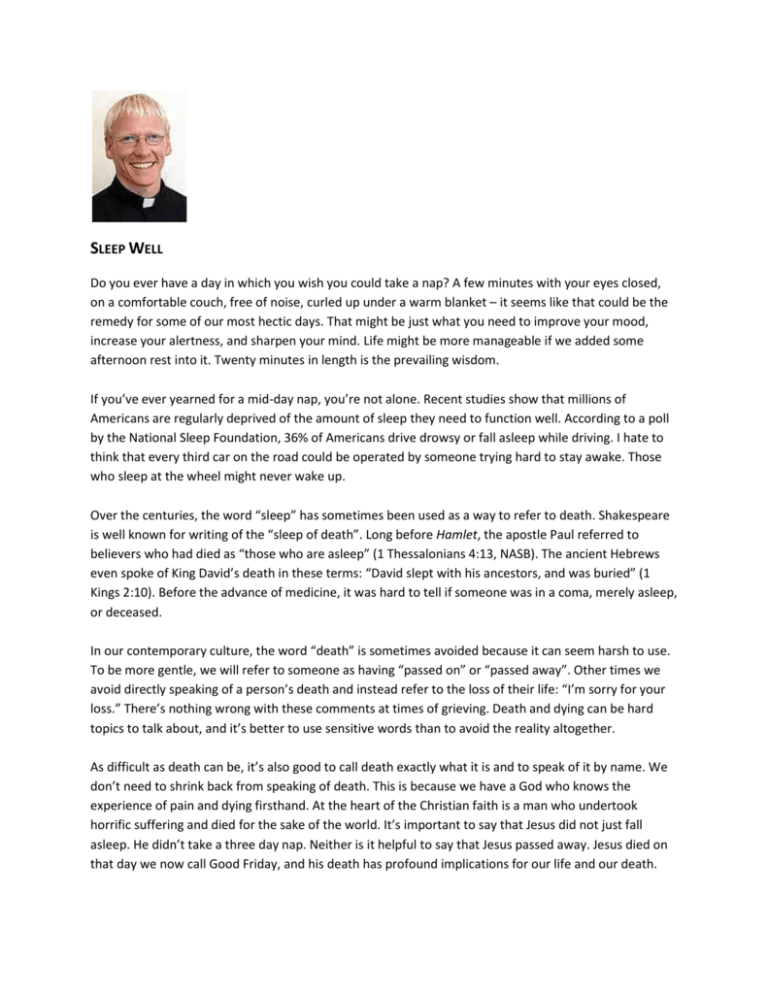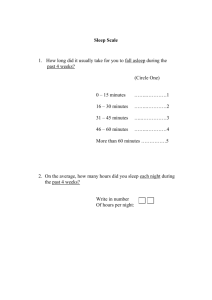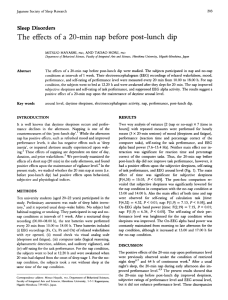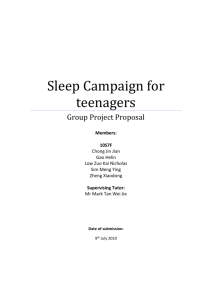Sleep Well
advertisement

SLEEP WELL Do you ever have a day in which you wish you could take a nap? A few minutes with your eyes closed, on a comfortable couch, free of noise, curled up under a warm blanket – it seems like that could be the remedy for some of our most hectic days. That might be just what you need to improve your mood, increase your alertness, and sharpen your mind. Life might be more manageable if we added some afternoon rest into it. Twenty minutes in length is the prevailing wisdom. If you’ve ever yearned for a mid-day nap, you’re not alone. Recent studies show that millions of Americans are regularly deprived of the amount of sleep they need to function well. According to a poll by the National Sleep Foundation, 36% of Americans drive drowsy or fall asleep while driving. I hate to think that every third car on the road could be operated by someone trying hard to stay awake. Those who sleep at the wheel might never wake up. Over the centuries, the word “sleep” has sometimes been used as a way to refer to death. Shakespeare is well known for writing of the “sleep of death”. Long before Hamlet, the apostle Paul referred to believers who had died as “those who are asleep” (1 Thessalonians 4:13, NASB). The ancient Hebrews even spoke of King David’s death in these terms: “David slept with his ancestors, and was buried” (1 Kings 2:10). Before the advance of medicine, it was hard to tell if someone was in a coma, merely asleep, or deceased. In our contemporary culture, the word “death” is sometimes avoided because it can seem harsh to use. To be more gentle, we will refer to someone as having “passed on” or “passed away”. Other times we avoid directly speaking of a person’s death and instead refer to the loss of their life: “I’m sorry for your loss.” There’s nothing wrong with these comments at times of grieving. Death and dying can be hard topics to talk about, and it’s better to use sensitive words than to avoid the reality altogether. As difficult as death can be, it’s also good to call death exactly what it is and to speak of it by name. We don’t need to shrink back from speaking of death. This is because we have a God who knows the experience of pain and dying firsthand. At the heart of the Christian faith is a man who undertook horrific suffering and died for the sake of the world. It’s important to say that Jesus did not just fall asleep. He didn’t take a three day nap. Neither is it helpful to say that Jesus passed away. Jesus died on that day we now call Good Friday, and his death has profound implications for our life and our death. When we are baptized, the waters are to us a spiritual death by drowning. In the drowning of baptism, we are united to the death of Jesus. Jesus died, and so will we die. We can approach life and death knowing that our savior has gone before us, knowing that we are united to the One who conquered death and rose to new life. If Jesus died, and didn’t just pass away, then neither will we merely pass away. We will die but not be lost. We will rise with Jesus to new life. Every time we go to bed or take a nap, we rehearse this dying and rising. We lie down in sleep, and we rise to a new day. Even on the day when we will sleep in death, we will rise to a day more glorious than we can imagine. Until then, let’s make the most of our going-to-sleep time. Pause to say a prayer – for the church and for those you love, and place yourself in God’s hands. Knowing that Jesus died and rose for us, we can live strong, die with grace, and sleep well. United in Christ, “For if we have been united with him in a death like his, we will certainly be united with him in a resurrection like his.” (Romans 6:5)











